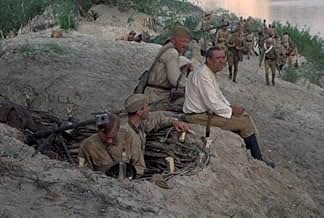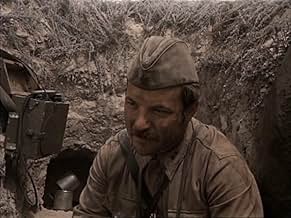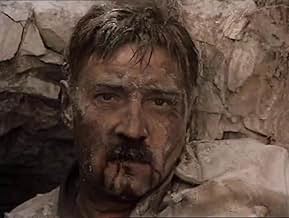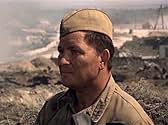PUNTUACIÓN EN IMDb
7,7/10
3,5 mil
TU PUNTUACIÓN
Las tropas rusas prometen evitar que el ejército alemán tome Stalingrado.Las tropas rusas prometen evitar que el ejército alemán tome Stalingrado.Las tropas rusas prometen evitar que el ejército alemán tome Stalingrado.
- Dirección
- Guión
- Reparto principal
- Premios
- 3 nominaciones en total
Lidiya Fedoseeva-Shukshina
- Glikeriya
- (as Lidiya Fedoseeva)
Reseñas destacadas
Not about the global war, the real war occurs inside each person. Sergey Bondarchuk show us a simple way of connecting with all cast. The usual hero war actor is replacing with a real soldier who have fears, willings, and hope. Your feels are honest and always survive the love for your motherland.
10richard6
They fought For Their Motherland is a screen adoption of the prize winning novel by Mikhail Sholokhovis and is directed by proclaimed Russian director Sergi Bondarchuk. It was nominated for the prestigious palme d'Or at Cannes film festival in 1975; which illustrate how powerful the film is. Approval for the film adoption of the Great Patriotic War came from the Russian Ministry of Defence via the Russian cinema council.
The film concentrates on a small number of individual regimental soldiers fighting within a larger battalion on the Russian Steppes in 1942. We are shown not noble soldiers and distinguished officers of the "glorious" Red Army, but ordinary fighting men. They are hungry, dirty, mentally and physically drained. Also, they are exhausted by their continuous 12 months retreat eastwards towards the river Donn and eventually Stalingrad. The soldiers find harmony in talking about home, family and express their emotions and feeling on the war and what it as done to them as people and their motherland. Location is presented impressively on film; firstly, by using wide angel lenses to capture the vast midst of the Steppe salt marches and corn fields. Secondly, by using close angel lenses to photograph the soldiers as they pass through, rest and interact with nervous civilians in the inhabited dwellings. With a large budget comes large battle scenes. The film shows the merciless destruction of land and villages by Luftwaffe air strikes. Defensive formations containing a whole battalion which is broad in scale and includes large battle formation shoots. The film doesn't over exaggerate when handling the destruction, human cost and horror of battle in its scenes.
The main depiction of war, battle and destruction are powerfully focused on individual soldiers. This film tells a similar story for many veteran soldiers of the second world war, whatever the nationality. Boredom, fatigue, fear, fun, friendship, enemies, orders, pain, loss, distress, death and a longing to go home.
They Fought For Their Motherland" tours the inferno imposed upon the soviet people, both military and civilian, on one side by the advancing, all concurring, disciplined German army. And on the other by years of hardship, personal sacrifice, poverty and living to the ideologist view of the soviet dictatorship. This is not the most graphic of war films in todays standard of brutal, realistic, fast passed combat movies. There are scenes of battle sustained injuries and death. However, this film focuses the humanity of war and what it does to the land, and the opinions of people in occupied nations towards the soldiers who are there to protect them. This is a patriotic film from a Russian point of view, which for many years, as at the time of release, future Russian generations, and other nations that fought in the red army, should look back with pride and honour towards those who fought, and died, for their motherland.
The film concentrates on a small number of individual regimental soldiers fighting within a larger battalion on the Russian Steppes in 1942. We are shown not noble soldiers and distinguished officers of the "glorious" Red Army, but ordinary fighting men. They are hungry, dirty, mentally and physically drained. Also, they are exhausted by their continuous 12 months retreat eastwards towards the river Donn and eventually Stalingrad. The soldiers find harmony in talking about home, family and express their emotions and feeling on the war and what it as done to them as people and their motherland. Location is presented impressively on film; firstly, by using wide angel lenses to capture the vast midst of the Steppe salt marches and corn fields. Secondly, by using close angel lenses to photograph the soldiers as they pass through, rest and interact with nervous civilians in the inhabited dwellings. With a large budget comes large battle scenes. The film shows the merciless destruction of land and villages by Luftwaffe air strikes. Defensive formations containing a whole battalion which is broad in scale and includes large battle formation shoots. The film doesn't over exaggerate when handling the destruction, human cost and horror of battle in its scenes.
The main depiction of war, battle and destruction are powerfully focused on individual soldiers. This film tells a similar story for many veteran soldiers of the second world war, whatever the nationality. Boredom, fatigue, fear, fun, friendship, enemies, orders, pain, loss, distress, death and a longing to go home.
They Fought For Their Motherland" tours the inferno imposed upon the soviet people, both military and civilian, on one side by the advancing, all concurring, disciplined German army. And on the other by years of hardship, personal sacrifice, poverty and living to the ideologist view of the soviet dictatorship. This is not the most graphic of war films in todays standard of brutal, realistic, fast passed combat movies. There are scenes of battle sustained injuries and death. However, this film focuses the humanity of war and what it does to the land, and the opinions of people in occupied nations towards the soldiers who are there to protect them. This is a patriotic film from a Russian point of view, which for many years, as at the time of release, future Russian generations, and other nations that fought in the red army, should look back with pride and honour towards those who fought, and died, for their motherland.
Sergei Bondarchuk is a great director. He has proved it with War and Peace, with Waterloo and now again with They Fought for Their Moterhland.
The film looks great. It's amazing how Bondarchuk can translate a world to film and still make it feel very real. The production is great, except for some minor things (tank turrets don't move). When I watched this film, I got the feeling that the whole world was at war. Not only these soldiers somewhere in Russia, but that they were just small parts in a big world conflict.
Most people always complain about the acting in Russian movies. That doesn't go for this one. It all feels very natural. The pain they show looks real, their sweat is there and I cannot imagine it with other actors (or acting method). Sergei Bondarchuk himself plays a role and he shows that he cannot only direct, but also act.
What I loved the most, is that this film shows war as I think it is. There are humans, the enemy is just a dot far away and every fight there are losses. Russians and Germans bleed alike. The Soviet flag is shown and it's clear who we are supposed to root for, but the main characters aren't heroes. They fight because they are told too, not because they are tough.
The music is like the music of War and Peace; not really pleasant to listen to, but it's perfect for the film. When an act of horror is shown, voices rise as if they complain. A requiem to humanity.
They Fought for their Motherland is bit like Spielbergs Saving Private Ryan; only without the misplaced heroism and with that touch of humanity.
Maybe not for everyone (since their is a delicate balance between spectacle, humanity and of course philosophy), but when you are looking for more aspects of war than just the heroic stereotype combat, go for this.
The film looks great. It's amazing how Bondarchuk can translate a world to film and still make it feel very real. The production is great, except for some minor things (tank turrets don't move). When I watched this film, I got the feeling that the whole world was at war. Not only these soldiers somewhere in Russia, but that they were just small parts in a big world conflict.
Most people always complain about the acting in Russian movies. That doesn't go for this one. It all feels very natural. The pain they show looks real, their sweat is there and I cannot imagine it with other actors (or acting method). Sergei Bondarchuk himself plays a role and he shows that he cannot only direct, but also act.
What I loved the most, is that this film shows war as I think it is. There are humans, the enemy is just a dot far away and every fight there are losses. Russians and Germans bleed alike. The Soviet flag is shown and it's clear who we are supposed to root for, but the main characters aren't heroes. They fight because they are told too, not because they are tough.
The music is like the music of War and Peace; not really pleasant to listen to, but it's perfect for the film. When an act of horror is shown, voices rise as if they complain. A requiem to humanity.
They Fought for their Motherland is bit like Spielbergs Saving Private Ryan; only without the misplaced heroism and with that touch of humanity.
Maybe not for everyone (since their is a delicate balance between spectacle, humanity and of course philosophy), but when you are looking for more aspects of war than just the heroic stereotype combat, go for this.
As a tradition for Soviet movies, most of the actors here are theatrical actors and their interaction on the screen is nothing if not realistic and natural. But Shulshin's talent makes him rise above others.
If that's not enough you have Nikulin, who was a war veteran himself, in one of his dramatic roles.
If that's not enough you have Nikulin, who was a war veteran himself, in one of his dramatic roles.
A major war movie, with an intimate sight on a Soviet regiment that is fighting back invading Nazi troops while retreating. Another interesting issue that is portrayed here are their relations with local peasant people, whose feelings towards retreat are well explored by the script too. Anyway, the greatest merit of this film are the war scenes, very well done, quite realistic.
¿Sabías que...?
- CuriosidadesThis was the last film of Vasiliy Shukshin.
- PifiasDuring the first battle, a few of the Germans are carrying MP44 (or STG 44) assault rifles. This film takes place in summer 1942 and those rifles were not in service in the German army (even as prototypes) until over two years later.
- Citas
Ivan Zvyagintsev: May our love towards our country live in our hearts as long as we live.
Ivan Zvyagintsev: May our hatred to enemy always shine on the tips of our bayonets...
- ConexionesFeatured in Sergey Bondarchuk (1982)
Selecciones populares
Inicia sesión para calificar y añadir a tu lista para recibir recomendaciones personalizadas
- How long is They Fought for Their Country?Con tecnología de Alexa
Detalles
- Fecha de lanzamiento
- País de origen
- Idioma
- Títulos en diferentes países
- They Fought for Their Country
- Localizaciones del rodaje
- Mosfilm Studios, Moscú, Rusia(Studio)
- Empresas productoras
- Ver más compañías en los créditos en IMDbPro
Contribuir a esta página
Sugerir un cambio o añadir el contenido que falta

Principal laguna de datos
By what name was Lucharon por su patria (1975) officially released in Canada in English?
Responde




































